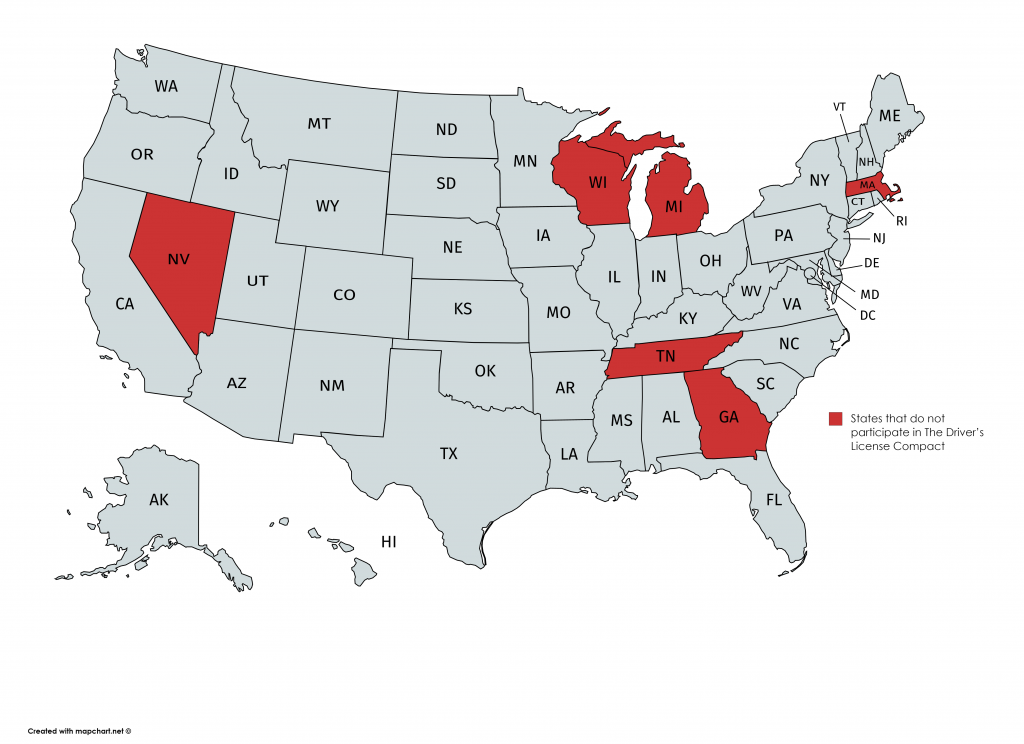Drivers who have a license issued in one state but get a traffic ticket in another often assume that there is no way for the ticket to affect them. They are wrong. That’s because of something called the Driver’s License Compact (DLC). The DLC is an interstate agreement amongst states to share information about each other’s drivers. Among the information shared are details about traffic ticket convictions and any administrative actions (i.e. suspensions) taken against a driver from another state.
The DLC is important for drivers to understand because it means a driver can never escape the consequences of a traffic ticket conviction, even if the ticket is issued in another state. DLC member states that convict out-of-state drivers will communicate details of the conviction and the offense to the licensing state, which in turn will note the offense and all relevant details on the person’s driving record. This can affect one’s ability to drive in one or both states and can even impact auto insurance rates.
Traffic Ticket Convictions
Member states agree to report the conviction of an out-of-state driver to the licensing authority of that person’s home state within 15 days of the conviction. The information sent to the home state identifies the individual, the violation, and the court or jurisdiction where the offense took place. It also notes the dates of arrest (if applicable) and conviction, as well as how the driver pled. Further, the information will include whether the conviction was the result of a guilty plea, judge’s ruling, or forfeiture of bail, bond, or other security. If there are any special findings, these too will be reported.
The report will also indicate whether the violation was committed in a commercial motor vehicle or in a motor vehicle carrying hazardous materials.
Suspensions or Revocations
Participating states will also send notice of any administrative actions against a driver--i.e. suspensions or revocations of driving privileges in that state. Such notice will include any relevant supporting documentation. In many cases, a suspension of privileges will affect the driver’s privileges in his/her home state as well. Some states are completely reciprocal, while others will only take action in response to specific convictions.
In cases involving suspension, revocation, or limitation of an individual’s driver’s license, participation in the DLC means states agree to give the same effect to the conduct reported as it would if the violation had occurred in the home state. As such, some states may impose greater or fewer consequences than would be assessed in the state of conviction.
Unpaid Tickets
When a driver fails to pay a traffic ticket issued in another state, that state will take action as it would for a driver that was licensed there. In many cases, such as New York and New Jersey, it can mean having one’s right to drive in the state suspended until the matter is resolved. The DLC agreement means that member states will communicate both the delinquency of the ticket and any decision to suspend driving privileges. As mentioned above, this could mean the licensing state will reciprocate the suspension or take other action as deemed appropriate had the driver failed to pay a ticket issued at home.
Points
The DLC does not give states the authority to assess them against an out-of-state license. However, states which use point systems will note the point value of any and all traffic convictions for out-of-state drivers. The consequences of those points can and will affect that driver. For example, a Connecticut driver who is convicted of 11 points-worth of traffic convictions can have his/her driving privileges suspended in New York.
Likewise, some states, such as New Jersey, will assess points against a driver who is convicted of a traffic violation while out of state. Others, such as New York, will not. Of course, states which do not use a point system will not assess points for out-of-state violations.
Fines
Regardless of whether a state participates in the DLC, the state in which the violation occurs sets the fine for the offense. In other words, a driver from Ohio who is ticketed for speeding in New York will pay the New York rate for the offense, not what he/she would have paid in Ohio.
Auto Insurance Rates
The DLC requires that member states display out-of-state traffic convictions on their drivers’ records. That means auto insurance carriers will eventually see the conviction, despite it occurring in another state. This is also true of any suspensions or delinquent tickets. How this will impact a driver’s premiums will depend on many factors, including the type of offense, the person’s driving history, age, and level of income.
States That Participate in the DLC

Nearly all states and the District of Columbia participate in the DLC. This includes:
- Alabama
- Alaska
- Arizona
- Arkansas
- California
- Colorado
- Connecticut
- Delaware
- District of Columbia
- Florida
- Hawaii
- Idaho
- Illinois
- Indiana
- Iowa
- Kansas
- Kentucky
- Louisiana
- Maine
- Maryland
- Minnesota
- Mississippi
- Missouri
- Montana
- Nebraska
- New Hampshire
- New Jersey
- New Mexico
- New York
- North Carolina
- North Dakota
- Ohio
- Oklahoma
- Oregon
- Pennsylvania
- Rhode Island
- South Carolina
- South Dakota
- Texas
- Utah
- Vermont
- Virginia
- Washington
- West Virginia
- Wyoming
Georgia, Massachusetts, Michigan, Nevada, Tennessee and Wisconsin do not currently participate. However, nearly all of the non-participating states have other policies or laws in place detailing processes and procedures for how to handle either out-of-state drivers convicted in their state, residents who are convicted of traffic violation while out-of-state, or both. In other words, just because a state does not participate in the DLC does not mean that a driver will be able to ignore or avoid the consequences of an out-of-state traffic ticket.
What to do About Out-of-State Tickets?
Drivers who are ticketed in another state should contact an attorney licensed to practice in the state in which the violation occurred. Hiring a traffic ticket attorney is the best path to reducing or eliminating the consequences of an out-of-state ticket. Depending on the state in question, an experienced attorney may be able to represent the driver without him/her having to return to the state in question.
If you or someone you love has been ticketed for an offense in New York or New Jersey, but are licensed in a different state, contact the Rosenblum Law right away for advice. The lawyers of the Rosenblum Law are experienced traffic ticket attorneys who have helped many out-of-state drivers defeat NY/NJ tickets. Email or call 888-883-5529 for a free consultation about your case.


